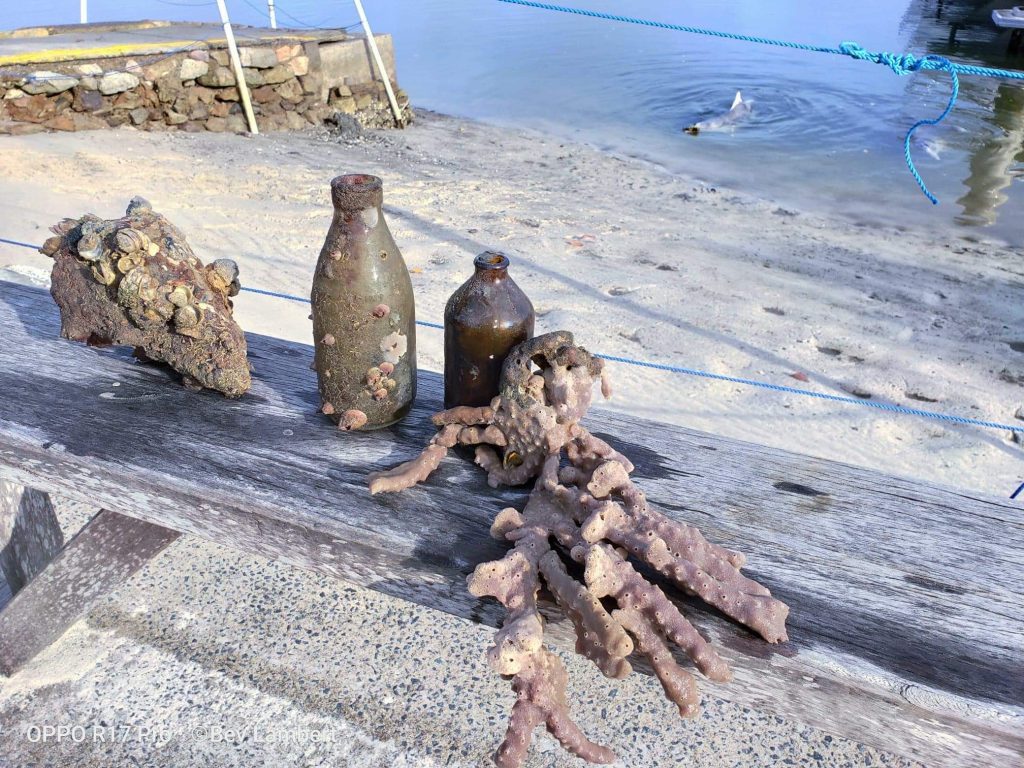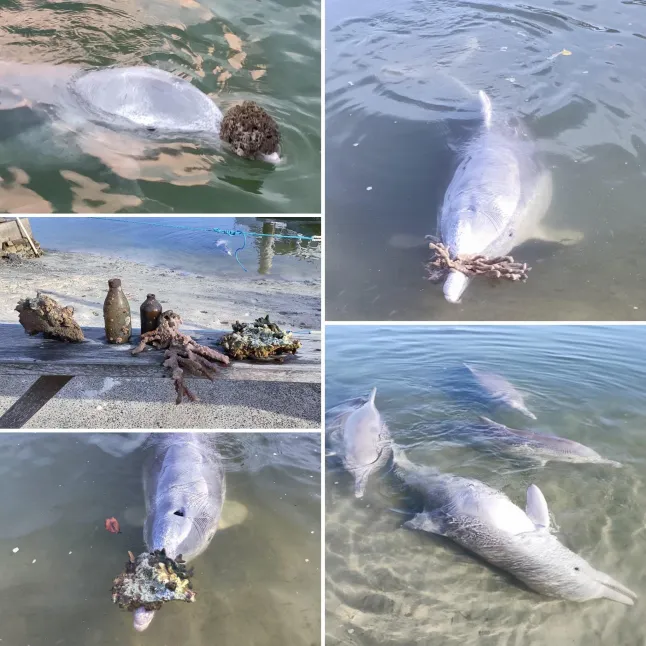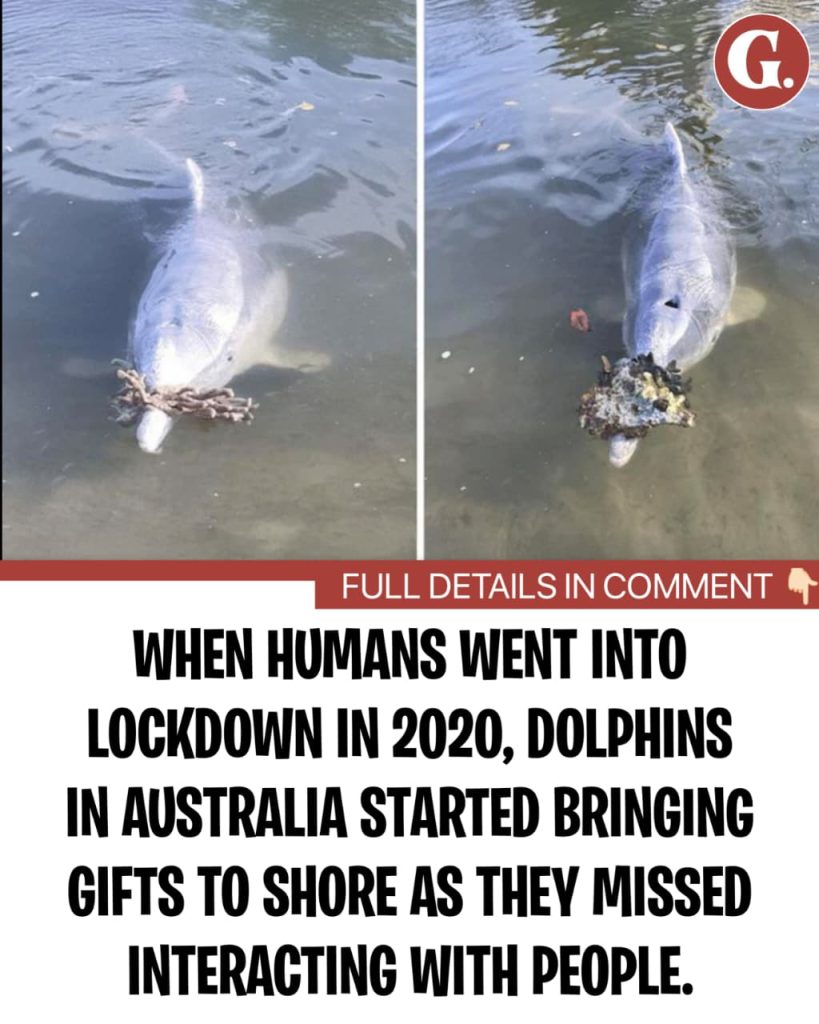When Humans Disappeared During Lockdown, Dolphins in Australia Began Bringing Gifts to Shore—A Heartwarming Reminder That Animals Miss Us Too
In 2020, the world went quiet. Streets emptied, beaches were deserted, and the hum of daily human life seemed to vanish overnight. The pandemic had forced us indoors, and while we were adjusting to life in isolation, something unexpected was unfolding in the waters of Queensland, Australia. Without the usual bustle of beachgoers and tourists, a group of wild dolphins began doing something remarkable. They started bringing “gifts” to shore. Pieces of coral, sea sponges, shells, and even bits of driftwood began appearing on the sand, delivered straight from the ocean by these intelligent creatures. It was as if they were trying to fill the silence, to reach out and say, “We miss you.”

The star of this unexpected exchange was a male humpback dolphin named Mystique. Known to locals and regular visitors of the Barnacles Café and Dolphin Feeding Centre in Tin Can Bay, Mystique had always been a curious and social animal. Before the lockdown, he was used to daily interactions with people who would feed and play with him. But when the pandemic closed the beaches, the absence of human presence didn’t go unnoticed by him or his pod. It seemed the dolphins, especially Mystique, were not just missing the free food—they were missing the company. In a display that felt almost human in its sentimentality, Mystique began retrieving treasures from the ocean floor and presenting them to the shore, waiting patiently for a response.
Those who cared for the dolphins were both touched and fascinated. Dolphins are highly intelligent mammals, capable of forming deep social bonds, not only with each other but also with humans. The gifts weren’t random debris—they were often beautiful or unusual items that must have taken time and effort to find. Mystique would carry them in his beak and swim right up to the shallow water’s edge, as if expecting someone to take them. In many cases, the staff at the café would find the items placed neatly on the sand or in the shallows, waiting to be noticed.

This behavior isn’t entirely unheard of in dolphins. In the wild, they are known to exchange items, play games, and even use tools. But the consistency and apparent thoughtfulness of Mystique’s actions during the lockdown were something different. Each gift seemed like an invitation to connect, a bridge between species during a time of forced separation. And it worked—images and videos of the dolphin’s generosity began circulating online, sparking warmth and joy in a world that was otherwise dealing with fear, loss, and uncertainty.
The people of Tin Can Bay had long known that the local dolphins were special. For decades, they had interacted with humans in a way that was respectful and voluntary, never forced. Visitors would gather on the shore, and the dolphins, without being coaxed or captured, would swim close enough to be fed and watched. It was a tradition built on mutual trust. But the lockdown changed everything. Without daily visits, Mystique’s behavior was a reminder that animals notice our absence just as much as our presence.

Experts have long believed that dolphins are capable of complex emotions. They recognize themselves in mirrors, understand symbols, and display empathy towards other animals, including humans. Mystique’s actions during the lockdown gave a glimpse into this emotional depth. The gifts weren’t just physical objects; they were gestures of connection. A shell could be a conversation starter. A piece of coral could be a wave hello. A sponge could be his way of saying, “I haven’t forgotten you.”
When restrictions began to ease, the visitors returned, and so did the familiar daily rituals between humans and dolphins. But the memory of those months—when the ocean seemed to send little care packages to the shore—remains powerful for those who witnessed it. It’s not often that we get such a clear sign that the relationship we have with wildlife is mutual. Too often, we think of animals as passive recipients of our attention. Mystique reminded the world that sometimes, they reach out to us too.

The story spread far beyond Tin Can Bay, resonating with people everywhere who were feeling the sting of isolation. It was a story about kindness without expectation, about bridging a gap not with words but with shared moments of curiosity and care. In a time when human-to-human connection was physically limited, it was comforting to know that the natural world was still out there, waiting for us, missing us, even trying to talk to us in its own way.
Looking back now, Mystique’s gifts feel like more than just a quirky lockdown phenomenon. They were a reflection of something deep in the human-animal bond—a reminder that life is interconnected in ways we sometimes forget. The ocean didn’t close during lockdown. The sun still rose. The tides still moved. And in those waters, a dolphin named Mystique was collecting treasures, not because he needed to, but because it brought him joy to share them.
In a time when the world felt small, his actions made it feel big again. And maybe that’s the greatest gift of all.


